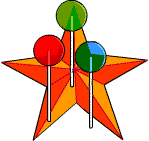The Eurovision Thing
Created | Updated May 29, 2002

The Eurovision Thing
Being European means you don't have a film industry worth a damn, a space program or any say in the way the world is run, but it does have a few advantages: you can be legitimately snotty about Americans should you so wish and - also, if it's your national cup of tea - you get to take part in the Eurovision Song Contest every May.
Now I'm aware some our more far-flung researchers may not be tremendously familiar with Eurovision and so here is your handy guide as well as a review of the 2002 contest. It is, as the title suggests, a song contest between the nations of Europe. It was originally intended to bring those nations together but has down the decades mutated into a sort of Rorschach test for the continent, indicating what's on everyone's minds and who is and isn't getting along. Most of Europe takes part, although for the last few years the Italians have decided not to play as they think (not without justification) that the whole thing is a high-camp celebration of the tacky and bizarre and is totally lacking in artistic merit. On the other hand, Israel and Russia compete, neither of which are strictly speaking European nations. But let's not quibble.
This year's extravaganza was held in Talinn, Estonia - it's traditionally staged by the previous year's winner, which may explain why some nations, not wishing the massive expense and potential for embarrassment implicit in such an honour, enter suspiciously poor songs year after year. The best Eurovision of recent years was surely the 1998 event, in which the German entrant accompanied himself on the cowbells and climbed into the lighting rig, and the eventual winner was an Israeli transsexual. Eurovision 2002 wasn't quite up to that standard, but there was as usual much to enjoy.
There used to be three main kinds of Eurosongs: the hyperactive pop tune, the over-wrought ballad, and the cunning attempt to write a song that sounds good in every language (hence past entries with titles like Ring-Dingi-Ding, Boom-Bang-A-Bang and Ding-A-Dong), but recent rules changes mean that everyone is now allowed to sing in English and so the third kind is a dying breed, sadly. The first two types were well represented this year, though. To be honest none of the songs were particularly memorable and so we had to rely on the costumes and staging for most of the entertainment.
This was by no means disappointing, though. The Greek contestants entered the theatre in what looked like body armour, probably a wise precaution given the exceedingly low quality of the rest of their act. The Belgian singer did handsprings across the stage during the middle eight of his song. Surprisingly, there was no mocking laughter during the Israeli entry, 'Light A Candle For Peace'. Stealing the show however, were the plucky Slovenians, three guys who turned up in sequined air hostess outfits and wigs. Well, we thought they were guys, if they weren't then I extend my apologies to any Slovenian researchers reading this.
After all the songs are complete the phone lines are thrown open for the peoples of Europe to think long and hard as to which song was best, and then vote for the one sung by their closest neighbour and ally. (While this is going on the audience is treated to dire live entertainment, normally involving dancers dressed as larches or elk.) Yes, the voting really is that corrupt: Greece gives Cyprus maximum votes, the Cypriots vote for the Greeks, the Scandinavians all club together, and so on. This is why the UK so rarely wins it: our only real neighbours are the Irish who hate us as much as everyone else.
Through the blizzard of geopolitical bias a winner normally emerges and this year it was a two-horse race from very early on. The Maltese entry, 'Seventh Wonder' by Ira Losco, stormed into an early lead but was soon hard pressed by 'I Wanna' from the Latvian singer, Marie N. Ira was an enthusiastic and fertile-looking performer, in a bell-bottomed trouser suit knitted out of string, but Malta lacked the crucial network of regional allies and suspicious block voting by the Balkans propelled Latvia across the line for their inaugural victory in Eurovision.
I'm slightly suspicious about what the rest of the audience saw in the Latvian act, to be honest. While an up-tempo tune, the lyrics were frequently unintelligible and the only really memorable bit of Marie N's performance was the way she came on in a white polyester suit before being gracefully relieved of most of her clothes by her backing singers in the course of the song. Riveting stuff for 50% of the audience and no mistake but not exactly winning it on musical merit. (And problematic for everyone as she didn't have time to get dressed again before reprising the song at the end of the show.) I really hope this trend for opportunistic ecdysia doesn't catch on or next year's show is going to resemble amateur night at Minsky's Burlesque. (Hmmm... Maybe I could live with that...)
Anyway, another year, another Eurovision. The whole circus moves on to the sunny climes of Riga next year. The UK will enter another ballad and come second or third, the French will stubbornly sing in French and be there or thereabouts, and the reinstated Irish will probably rack up yet another win. I love being a European.
